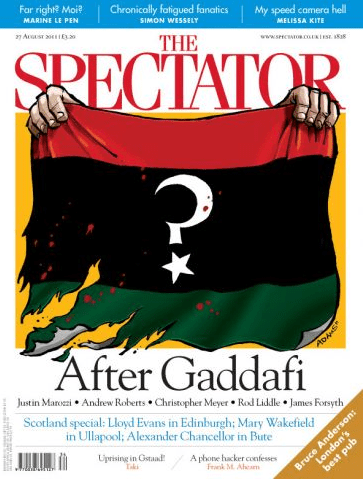 “It’s not over yet.” That has become the government’s Libyan
mantra, delivered with a tone of sombre sobriety. However, James Kirkup reports that, in private, ministers
are cock-a-hoop, already dreaming of photo-ops and triumphant flyovers.
“It’s not over yet.” That has become the government’s Libyan
mantra, delivered with a tone of sombre sobriety. However, James Kirkup reports that, in private, ministers
are cock-a-hoop, already dreaming of photo-ops and triumphant flyovers.
You wonder what Ed Llewellyn makes of the celebrations. Allegra Stratton has written a revealing profile of David Cameron’s chief-of-staff, ‘the most powerful man you rarely hear about’. Llewellyn is a foreign policy expert, a veteran of tours in the Balkans and the Far East. Stratton says he is:
‘Discreet personally and cautious politically, he will have insisted on megaphone caution from the PM and his cabinet ministers who duly took to the airwaves.’
I’m told that diplomats share his apprehension, fearing that Libya may yet combust as Iraq did. Hence the almost religious regularity with which William Hague talks about the need to establish stability.
Gaddafi’s continued liberty is the premier threat to stability at present, contends Robert Fisk in today’s Independent. Frustrated businessmen in Tripoli plainly agree, which is why they are offering bounties of $1 million (£) for the runaway dictator. This Wild West solution suits NATO’s view that stability can be secured by Libyans, with, as James Forsyth reveals in his latest politics column for the magazine (subscribers click here), the help of Arab states like Jordan, Qatar and so forth. British ministers are at pains to say that not one buffed British boot will be dirtied by Libyan dust. But Britain will assist in other ways, perhaps through mentoring and no small amount of money. The forthcoming Paris summit, co-chaired by Britain and France, will address these complexities.
It remains to be seen where Britain’s commercial advantage will sit in these discussions, a point made forcibly by Sir Christopher Meyer in an article in the latest issue of the Spectator (subscribers click here). Talking to people around and about Westminster, there is a sense that they’ve been caught out by the speed of Gaddafi’s collapse: someone close to the military effort told me recently that the government was planning for months more stalemate. Certainly, the rebel gains have been dramatic, but that’s no excuse for being underprepared, says Meyer. Securing Libyan business contracts should have been our ultimate objective from the start. “They owe us,” he says.
Grateful Libyans have been flying allied flags from their windows in recent days, but that’s no guarantee that our military assistance will be rewarded. Just as soldiers are doomed to fight the last war, so too are diplomats and politicians. The legacy of Iraq has governed this conflict and continues to do so. But, as Justin Marozzi says in our cover piece this week (subscribers click here), there is “no law that states Libya must now descend into anarchy.” Commercial opportunities may be lost if we expend too much effort worrying that Libya doesn’t become a second Iraq.
Soon after the coalition formed, it stated that selling UK PLC was its premier foreign policy objective. Aided by the coalition government, a varied array of British companies was operating in Gaddafi’s Libya until the revolt erupted in February. It will be a test of this government to ensure that British companies return with interest.
If you wish to read the articles above, you can subscribe to the Spectator from £1 a week.






Comments